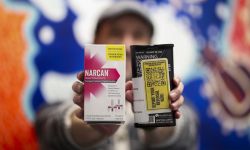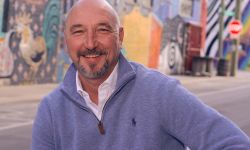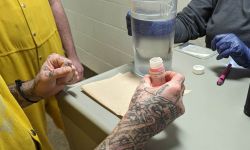In traveling RV, Michigan nurse tries to undo opioid damage she helped cause
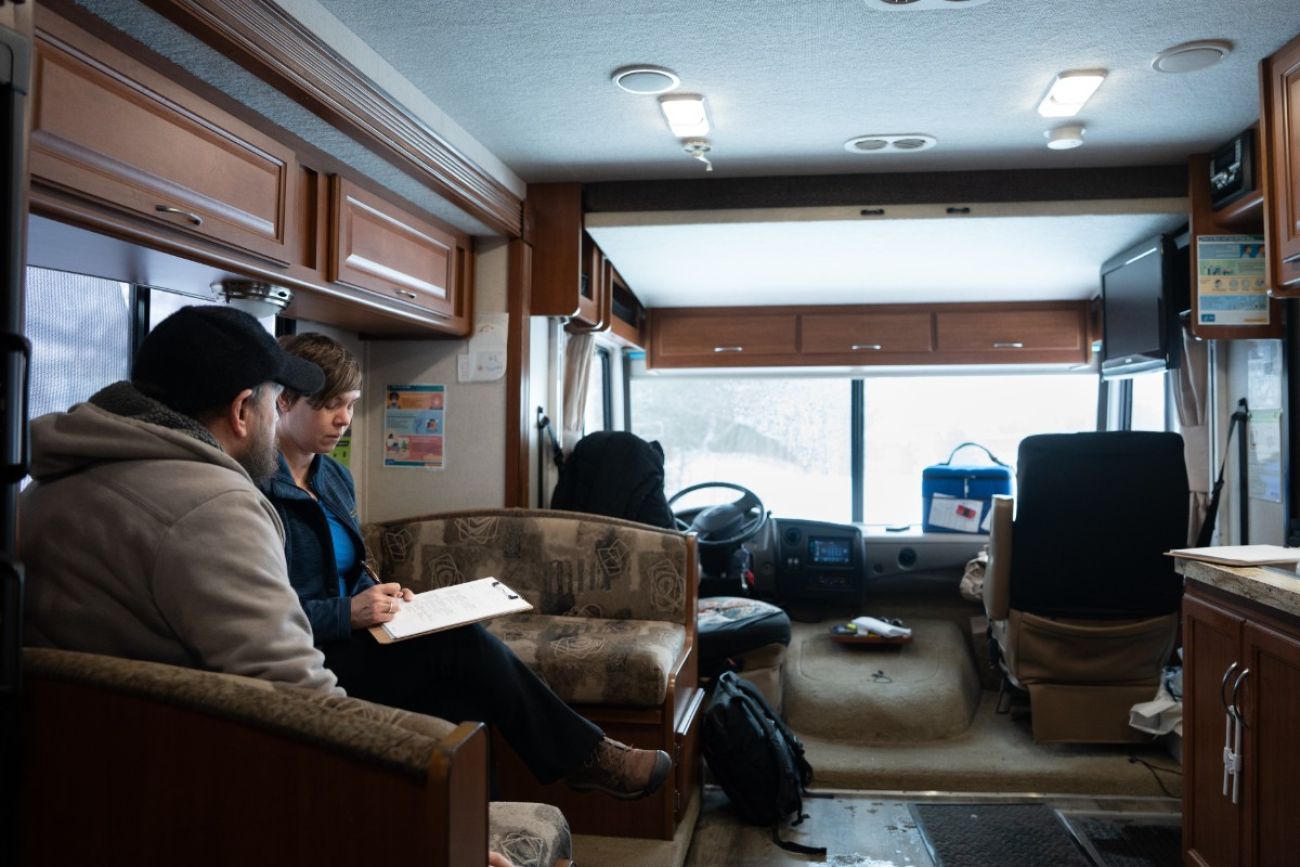

- As drug overdoses continue to kill thousands of Michiganders each year, Michigan wrestles with spending decisions over opioid settlement money
- Some users lack the transportation to treatment
- A Michigan nurse practitioner bought an RV, and then another and another, and is trying to reach them where they are
WIXOM — Jordana Latozas could offer an excuse for her part in Michigan’s deadly drug crisis.
She will not. She doesn’t even flinch.
“Did I contribute? Absolutely,” said Latozas, a nurse practitioner who prescribed countless pain pills more than a decade ago — a time when patients walked away with bottles full of opioids as the standard of care for pain.
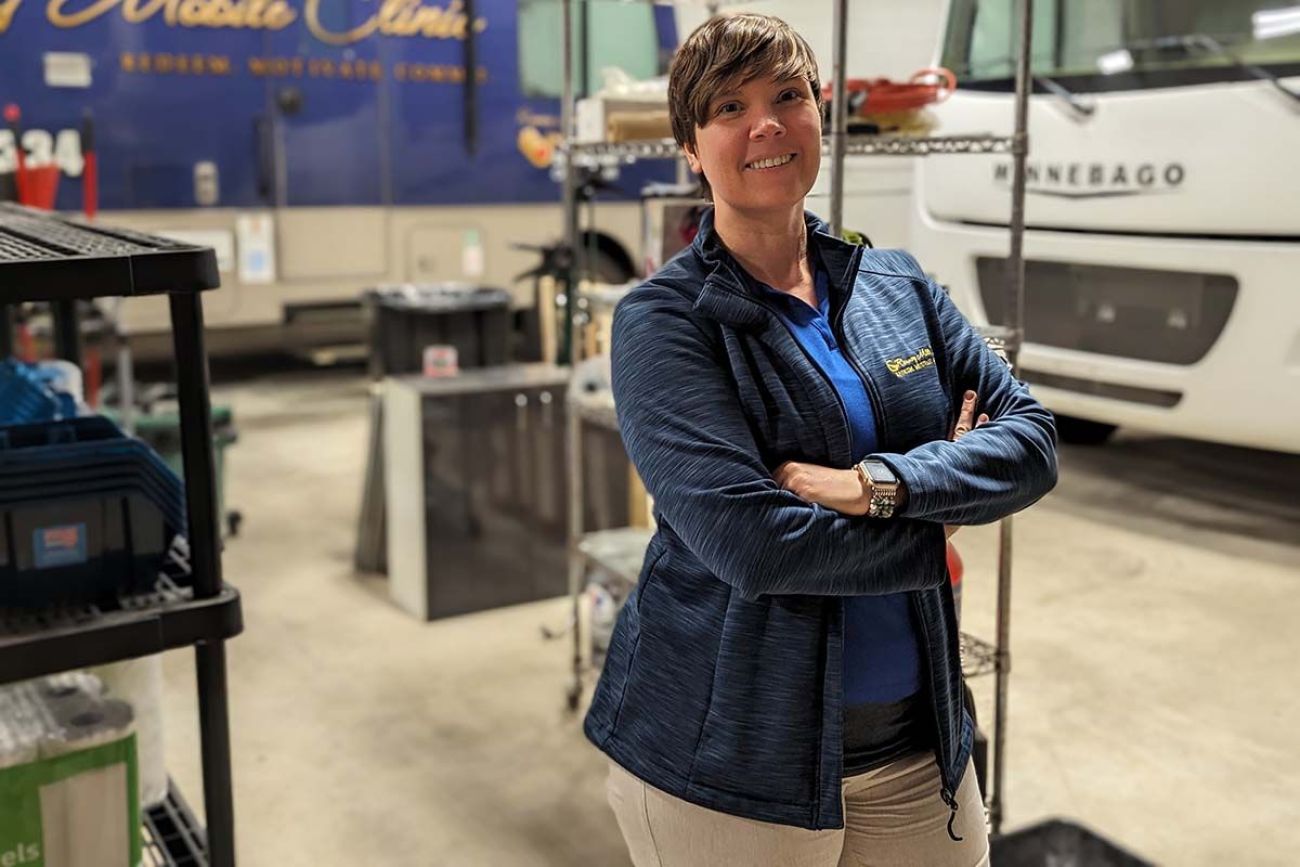
Years later, as medicine began understanding the nation’s addiction to the pills and the need to help patients, she said, “they did the opposite: slam the door in patients’ faces, criminalize behavior, and shut down access.”
“My onus of that is to take ownership of what happened,” she told Bridge Michigan.
Related:
- Fighting Michigan's opioid crisis with new needles, purer drugs, respect for addicts
- In drug-ravaged northern Michigan, there’s money for help. But few counselors
- Bridge’s examination of Michigan’s drug use and how it will opioid settlement money
Latozas, 41, was sitting in her office just a few dozen footsteps from a cavernous garage filled with RVs and vehicles — home of Recovery Mobile Clinic, a sort-of 29-foot urgent care on wheels with a focus toward those in addiction.
A line of metal shelves was stacked with sealed boxes of exam gloves and gauze and medical equipment, as well as motor oil and funnels and windshield wiper fluid.
These hulking blue vehicles represent a key piece in the state’s efforts to battle the opioid crisis, which most recently claimed a life about every four hours in Michigan. As part of a national settlement with opioid drugmakers and others, the state will receive more than $1.5 billion that will come to the state over 18 years for abatement efforts.
In the state’s most southeastern corner last spring, Monroe County commissioners allocated more than $35,000 to help pay for care provided by Latozas’ staff at Oaks Village in Monroe, a campus that includes a homeless shelter, food pantry, medical clinic and space for daily Alcoholics Anonymous meetings.
The money will cover costs for patients who are homeless, uninsured and have transportation barriers that prevent them from getting care. A centerpiece of care for patients with substance abuse disorders is once-monthly injections of Vivitrol — or naltrexone, a drug that stops the euphoria from opioids and alcohol.
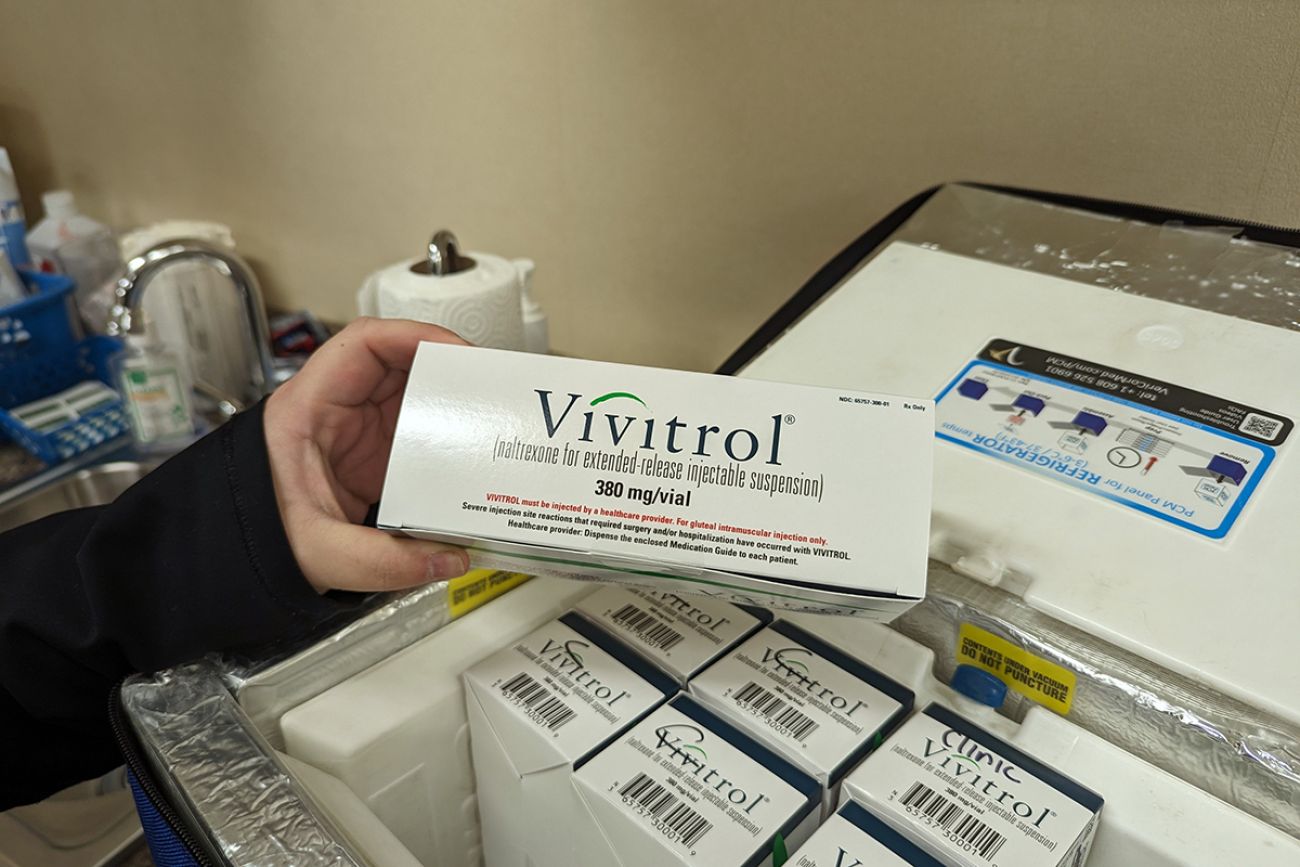
Earlier this year, it was so bitterly cold that there were few walk-ins at the Monroe clinic. It’s the one site where Recovery Mobile staff work inside a shelter rather than from their mobile unit. This day, they stayed busy restocking medical supplies, inventorying Vivitrol doses and working at computers.
“When it comes to how the opioid money is to be spent, the smartest way is face-to-face, peer-to-peer, and feet-on-the-street, or boots-on-the-ground — however you want to describe it,” said Randy Richardville, former Senate majority leader in Lansing and now the executive director of the Oaks.
His office, adorned with crosses and scripture that underscore the faith that fuels this work, is around the corner. People in treatment, peer recovery coaches, and others drop by to chat throughout the day, warmed by coffee and a nearby space heater.
While policymakers debate over how best to spend the settlement money, Richardville told Bridge, people like Latozas are already in the trenches.
“We don't need any generals,” he said. “We need a lot more soldiers.”
A joke taken seriously
Latozas work on the Recovery Mobile Clinic began in 2010. She was 27, and she’d taken her first job as a newly minted nurse at an interventional pain management clinic.
It was, she says now, “a very different world” — some 20,000 overdose deaths ago in Michigan.
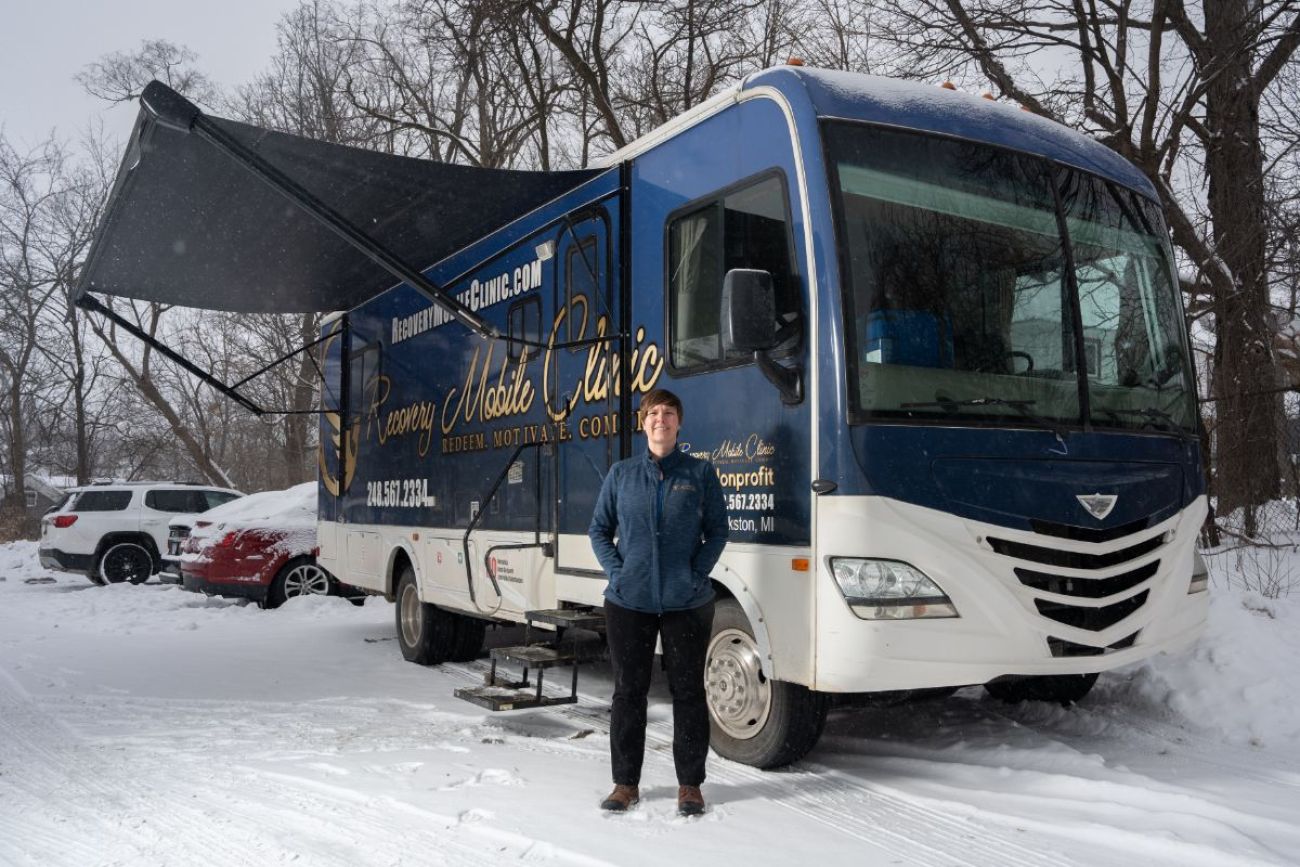
Pain had been declared “the fifth vital sign” — part of the standard of patient care alongside temperature, blood pressure, respiratory rate, and heart rate. The U.S. The Veterans Health Administration had announced a national strategy to improve pain treatment, and the same year Latozas took her new job, an international chorus of doctors and scientists, through the Declaration of Montreal, declared it a moral failure for doctors to fail at alleviating patients’ pain.
Deaths from synthetic opioids had not yet begun to skyrocket. The Comprehensive Addiction and Recovery Act of 2016 — sweeping legislation to address opioid addiction — was years away.
And it was in the middle of a 14-year stretch in which Michigan received a jaw-dropping 5.7 billion in prescription pills, according to one analysis.
“I can hide behind ‘I was brand new’ and ‘I was doing what everybody told me to do,’ and ‘I was following the research…’ But the reality is that the medical system as a whole did a lot of damage,” Latozas said.
Life moved forward; she had two children with college sweetheart Jeremy. She changed jobs, offering pain control for patients in hospice or through palliative care.
She was seeing a new kind of patient, too: those who were addicted to opioids, including those in medication assisted treatment. It’s a regimen of carefully-dosed drugs that help curb cravings for opioids and alcohol and can help fortify patients against emotional triggers that send them to another hit.
The crucial role of methadone or buprenorphine is well-established: Individuals have as much as double the odds of staying alive if their treatment involves methadone or buprenorphine, compared to those who go without, according to a 2019 publication of the National Academies of Sciences, Engineering, and Medicine.
But Latozas also saw the chasm — a literal gap of miles and miles at times — between care and patients who lacked transportation.
“When you're dealing with someone who's struggling with mental health and substance abuse, that inconsistency can be very dangerous,” Latozas said.
She and husband, Jeremy, were playing Cards Against Humanity with a friend one night, when Latozas began ruminating on her frustration.
“That's what my husband jokingly said ‘Well, we should just put it in an RV and drive it to them,’” she recalled.
Her response: Well, why not?
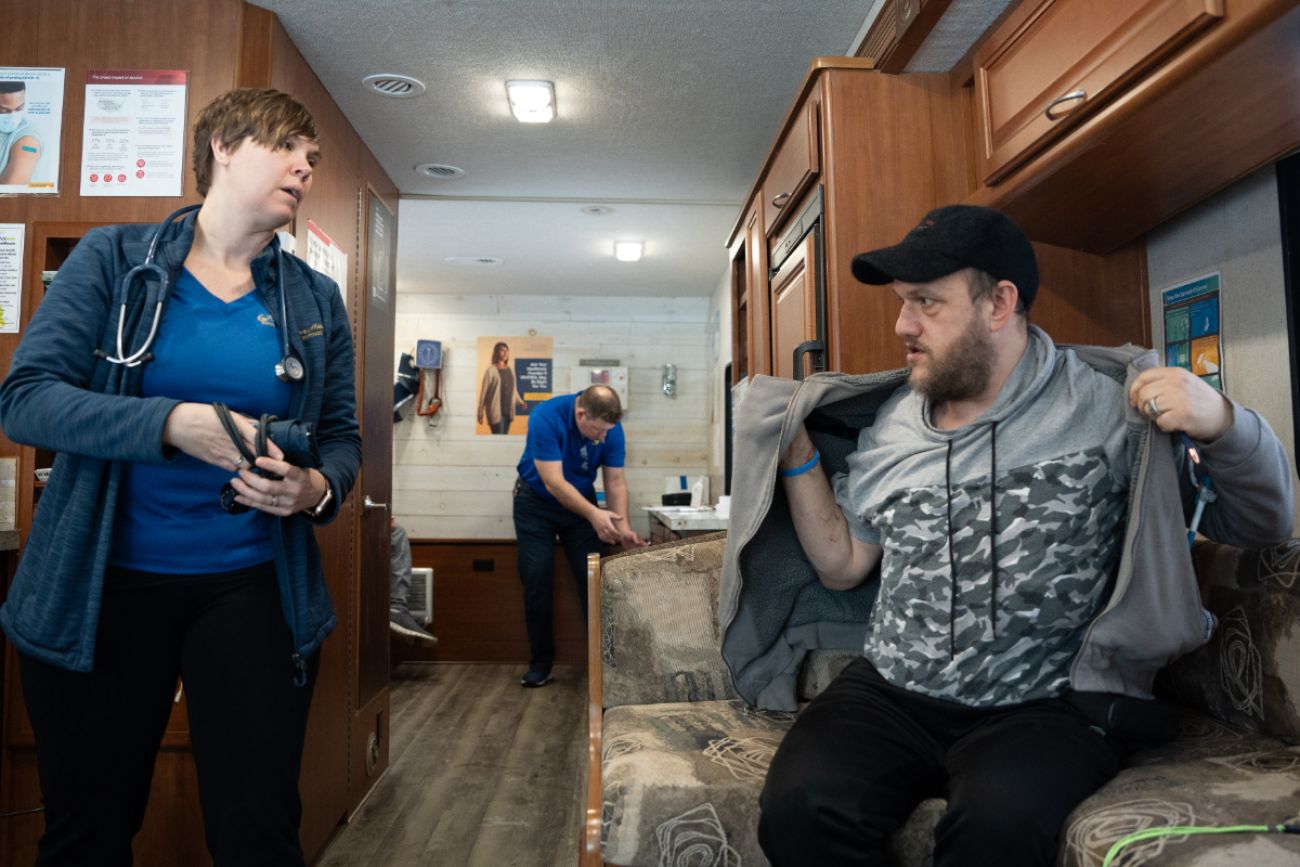
Great work. Go away.
Late in 2019, she said, she wiped out her 401(k) and also took out a $100,00 loan. She purchased a used Fleetwood RV, and the two Latozases began renovating it into the medical clinic it is today.
But she said local government leaders at first were as warm to listen to her as they were polite to dismiss her.
“People would say ‘That’s great work you’re doing. Now go somewhere else,’” she said. “I think they saw me as a pied piper, like I’d bring the problems with me.”
Then, COVID.
The Latozases pivoted, first providing COVID tests from their RV, then vaccines, then quietly moving into other services — pregnancy testing and flu shots, testing for hepatitis C, blood pressure assessment, and treatment for sexually-transmitted diseases.
It gave them the street cred they needed.
Addiction treatment “is still a very much part of what we are, but there's a reason why we sidestep it, and that reason is because of the stigma,” she said. “We're able to move a lot faster, bringing addiction treatment with (the rest of these other services) rather than leading with addiction.”
The business model works, too, because of the Latozas’ partnership. Jeremy Latozas’ business, Specialty Fleet Services, purchases used RVs, renovates and fits them for medical care, and leases them to the Recovery effort. Specialty and Recovery, in fact, share this Wixom building at the dead end of this quiet, commercial stretch of road.
The partnership, Jordana Latozas said, keeps “costs way down.”
Today, Latozas oversees 14 staff and a fleet of five mobile medical clinics — three RVs, a Chevy Equinox and a retrofitted ambulance — at 28 sites through five southeast Michigan counties: Wayne, Oakland, Macomb, Monroe and Genesee.
Last year’s budget was about $1.6 million, she said.
Latozas is working out the business model so she can franchise the businesses elsewhere — an effort, she said, that will save other nurse practitioners the sweat and time of figuring out how to make the model work for them.
“I will retire when I have a mobile recovery unit in every Lower 48 (state),” she said, adding with a smile, “a small goal.”
See what new members are saying about why they donated to Bridge Michigan:
- “In order for this information to be accurate and unbiased it must be underwritten by its readers, not by special interests.” - Larry S.
- “Not many other media sources report on the topics Bridge does.” - Susan B.
- “Your journalism is outstanding and rare these days.” - Mark S.
If you want to ensure the future of nonpartisan, nonprofit Michigan journalism, please become a member today. You, too, will be asked why you donated and maybe we'll feature your quote next time!
